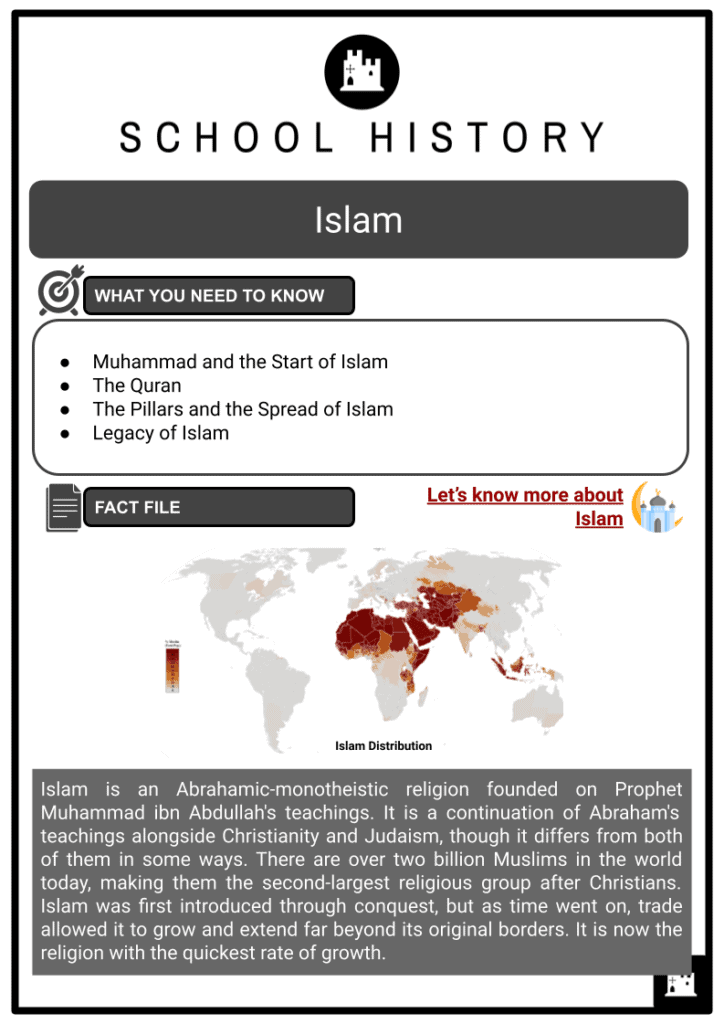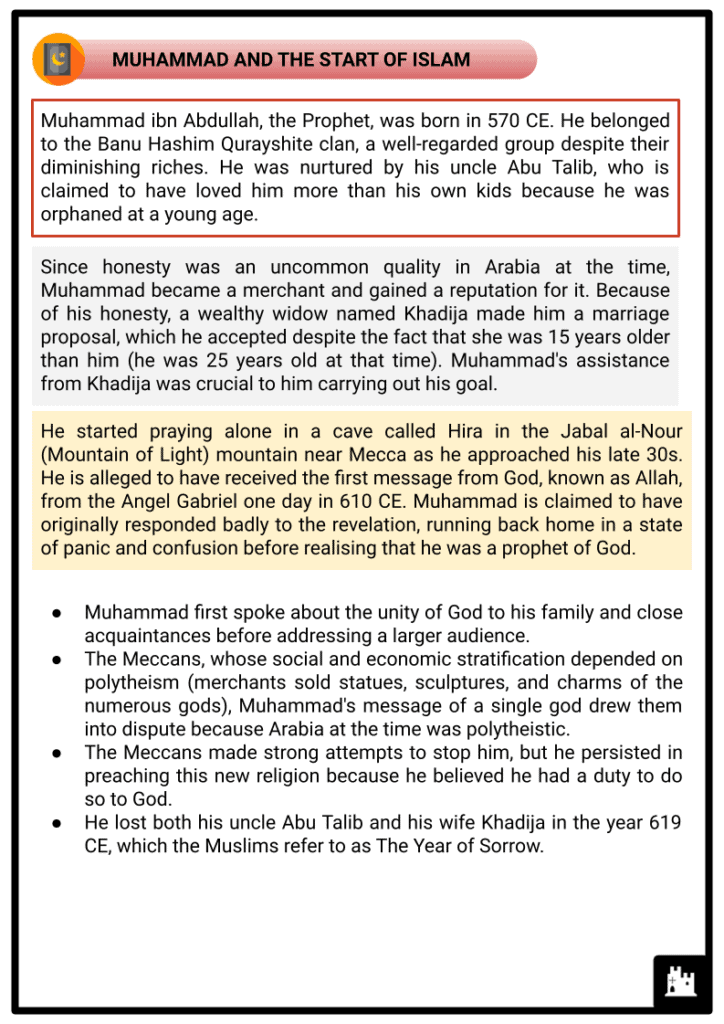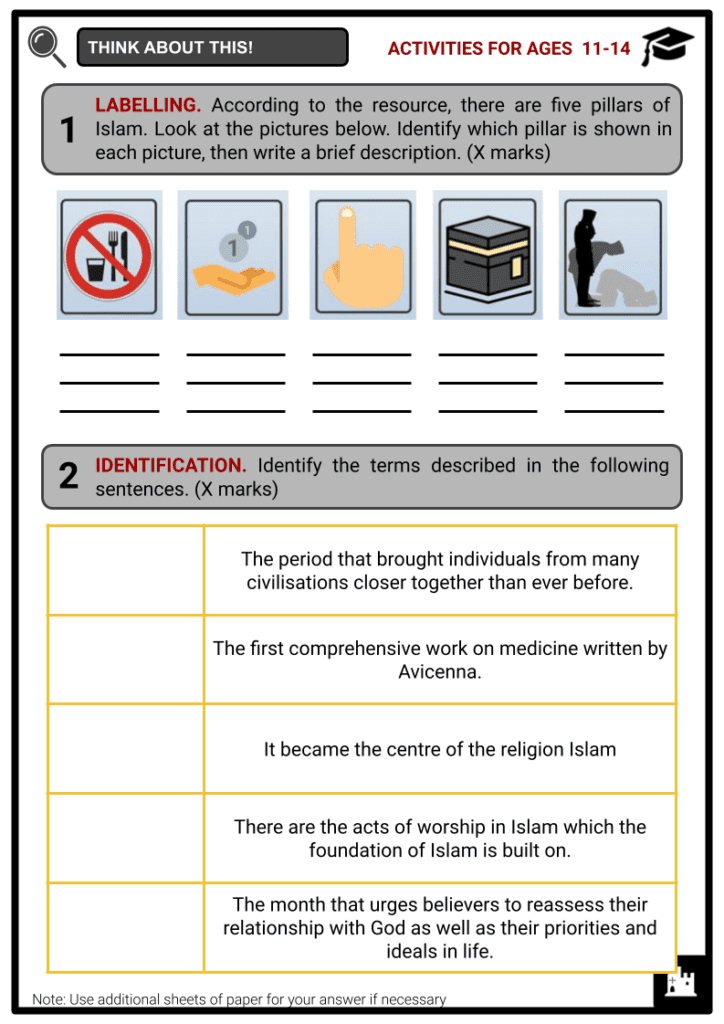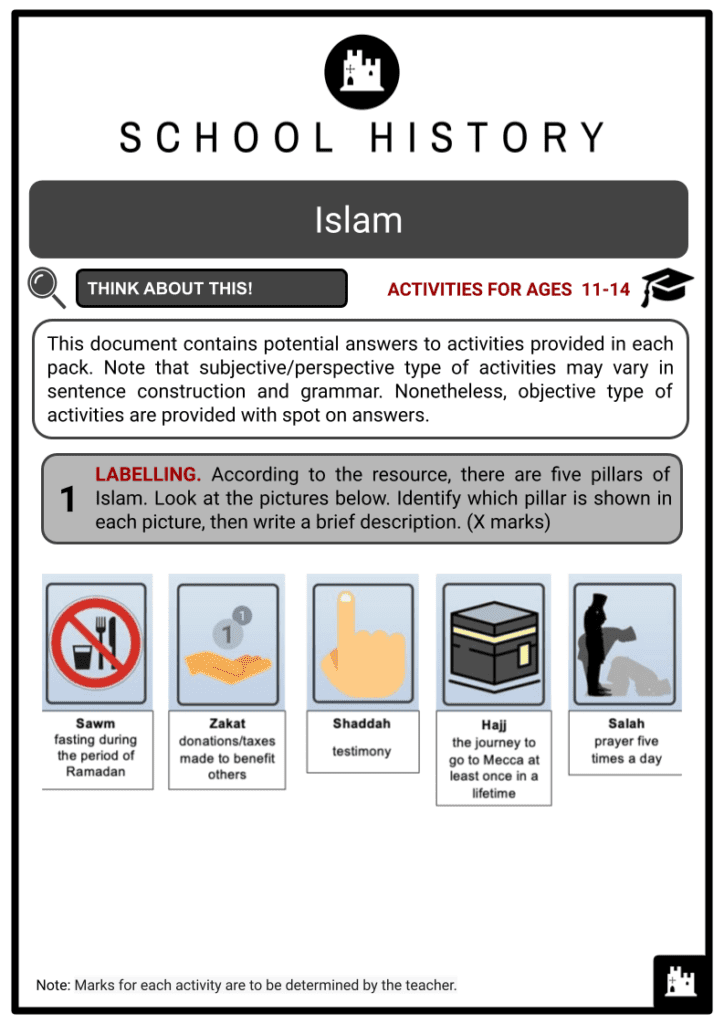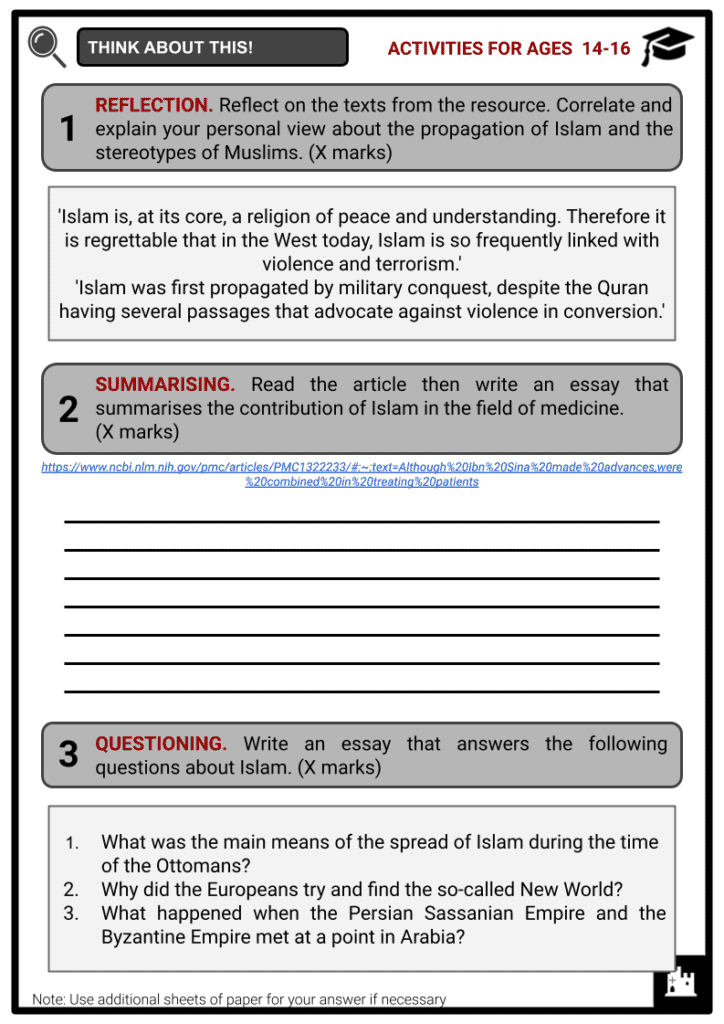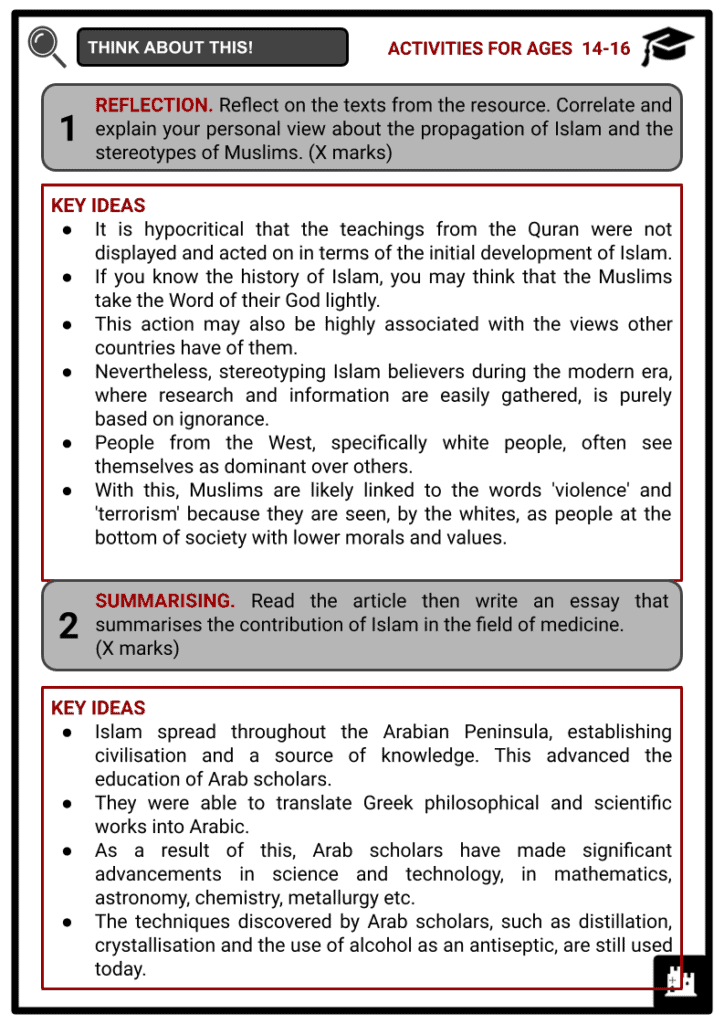Islam Worksheets
Do you want to save dozens of hours in time? Get your evenings and weekends back? Be able to teach about Islam to your students?
Our worksheet bundle includes a fact file and printable worksheets and student activities. Perfect for both the classroom and homeschooling!
Summary
- Muhammad and the Start of Islam
- The Quran
- The Pillars and the Spread of Islam
- Legacy of Islam
Key Facts And Information
Let’s know more about Islam!
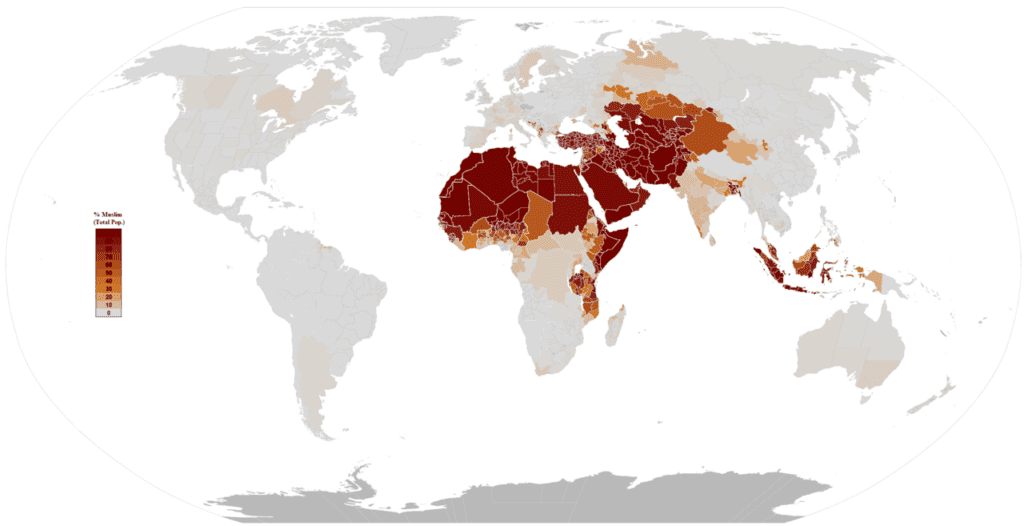
Islam is an Abrahamic-monotheistic religion founded on Prophet Muhammad ibn Abdullah's teachings. It is a continuation of Abraham's teachings alongside Christianity and Judaism, though it differs from both of them in some ways. There are over two billion Muslims in the world today, making them the second-largest religious group after Christians. Islam was first introduced through conquest, but as time went on, trade allowed it to grow and extend far beyond its original borders. It is now the religion with the quickest rate of growth.
MUHAMMAD AND THE START OF ISLAM
- Muhammad ibn Abdullah, the Prophet, was born in 570 CE. He belonged to the Banu Hashim Qurayshite clan, a well-regarded group despite their diminishing riches. He was nurtured by his uncle Abu Talib, who is claimed to have loved him more than his own kids because he was orphaned at a young age.
- Since honesty was an uncommon quality in Arabia at the time, Muhammad became a merchant and gained a reputation for it. Because of his honesty, a wealthy widow named Khadija made him a marriage proposal, which he accepted despite the fact that she was 15 years older than him (he was 25 years old at that time). Muhammad's assistance from Khadija was crucial to him carrying out his goal.
- He started praying alone in a cave called Hira in the Jabal al-Nour (Mountain of Light) mountain near Mecca as he approached his late 30s. He is alleged to have received the first message from God, known as Allah, from the Angel Gabriel one day in 610 CE. Muhammad is claimed to have originally responded badly to the revelation, running back home in a state of panic and confusion before realising that he was a prophet of God.
- Muhammad first spoke about the unity of God to his family and close acquaintances before addressing a larger audience.
- The Meccans, whose social and economic stratification depended on polytheism (merchants sold statues, sculptures, and charms of the numerous gods), Muhammad's message of a single god drew them into dispute because Arabia at the time was polytheistic.
- The Meccans made strong attempts to stop him, but he persisted in preaching this new religion because he believed he had a duty to do so to God.
- He lost both his uncle Abu Talib and his wife Khadija in the year 619 CE, which the Muslims refer to as The Year of Sorrow.
- As a result, he felt alone in the world and was profoundly grieving. The persecution he endured in Mecca only made matters worse.
- The Prophet and his followers were welcomed to Yathrib (later known as Medina) by some of its residents in 621 CE, who had joined Islam.
- Muhammad travelled to Yathrib in 622 CE after fleeing Mecca to avoid assassination attempts. This journey is referred to as the Hegira and marks the start of the Muslim calendar.
- The city valued his teachings and wished for the Prophet to preside over and oversee civic operations.
- In Mecca, Muhammad urged his people to go to Yathrib, and they did so in waves.
- He went with Abu Bakr, a loyal friend of his (and future father-in-law), after most of his comrades had departed.
- The Muslims sought to retaliate against those who had mistreated them with their newly acquired support system. On a regular basis, the Muslims began to plunder or 'razzia' Meccan trade caravans. The Meccan industry suffered as a result of these raids, which were formally acts of war. As a result, they were furious and resolved to eradicate the Muslims once and for all. At the Battle of Badr in 624 CE, 313 Muslim soldiers defeated a Meccan army of about 1,000 men. Some attribute this victory to divine assistance, while others attribute it to Muhammad's military strength.
- Following the triumph at Badr, the Muslims evolved into more than simply a sect of a brand-new religion: they also became a formidable military force. Thereafter, the Muslims and other Arabian tribes engaged in several battles, all of which were quite successful for the Muslims. The Muslim army was allowed entry into Mecca in 630 CE, ten years after they had evacuated the city in a panic. Despite all expectations, Muhammad granted amnesty to anybody who surrendered and embraced his Islam once Muslims had taken control of Mecca.
- Muhammad was the most influential religious and political figure in all of Arabia at the time of his death in 632 CE. The majority of the tribes had sworn loyalty to him and become Muslims. He passed away and was buried in Medina at his own home. Millions of Muslims visit the site each year since it has been transformed into the Roza - e - Rasool (Tomb of the Prophet), which is located next to the revered Masjid al-Nabwi (Mosque of the Prophet) in Medina. The revelations that Muhammad is supposed to have received from the angel Gabriel were remembered by his adherents and recorded as the Quran, also known as 'the instruction' or 'the recitation', the holy book of Islam, within a few years after his passing.
THE QURAN
- Muslims believe that the verses of the Quran, as they were spoken to Muhammad by an angel, represent the last revelation of divine truth to humans. As the first caliph (the predecessor to the Prophet's mission and dominion), Abu Bakr gathered these revelations into a book after Muhammad's passing in order to preserve them for subsequent generations. During the Prophet's lifetime, these revelations were recorded individually on parchment or other materials, and they were eventually put together in the Quran according to the Prophet's specified order.
- Muslims would learn the verses and recite them, which is why 'the recitation' is one of the translations of 'Quran'.
- Later, it was discovered that different Muslims were repeating the verses in various languages, therefore a movement to standardise the verses was started in order to preserve the Prophet's message.
- The text was guarded from any manipulation with the utmost care.
- The third caliph, Uthman ibn Affan, completed this mission, which was hesitantly begun by Caliph Abu Bakr, the immediate heir of Muhammad's kingdom (who was scared to undertake what the Prophet had not done).
- For Muslims, reading or hearing the Quran in its original Arabic is the only way to comprehend it correctly.
- Although some sects consider precise translations to be acceptable, followers are nonetheless urged to memorise the Quran in its original language.
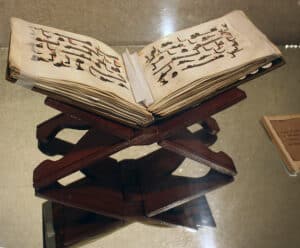
Quran - The life of the Prophet, including his deeds (Sunna) and words (Hadith), which serve as a complement to the Quran's text, is a significant source of guidance for Muslims after the Quran. As already mentioned, the Quran is regarded as the Word of God, but Muslims also find comfort and direction in understanding how Muhammad would have acted in various circumstances. For this, the Sunna and Hadith are significant. Therefore, the Quran gives believers access to God's Word, while the Sunna and Hadith provide instructions on how to observe that Word and incorporate its precepts into everyday life.
PILLARS AND THE SPREAD OF ISLAM
- The formal obligations that all those who choose Islam as their path must accept and uphold are known as the acts of worship, or the 'pillars' on which the foundation of Islam is built. Islam's Five Pillars are:
- Shahada - testimony
- Salah - prayer five times a day
- Zakat - donations/taxes made to benefit others
- Sawm - fasting during the period of Ramadan
- Hajj - the journey to go to Mecca at least once in a lifetime
- The first pillar, Shahada, is required for anybody to become a Muslim. It is the recognition of Allah's oneness in all qualities and is typically represented in the phrase: 'There is no one worthy of worship but Allah (God), and Muhammad is Allah's Prophet.' Islam's idea of God holds that he is ultimate and beyond every comprehension – everything in the universe must submit to his will in order for humans to live in peace. The pronoun 'he' is just used for convenience and does not in any way imply any of his characteristics. In actuality, the name 'Islam' literally translates as 'submission', as in submitting oneself to God's will.
- The daily Salah prayer, which must be performed five times a day, is the second pillar. While women are permitted to pray at home, males are compelled to offer their prayers in congregation in designated Muslim worship spaces called Masjid (mosques). The fundamental layout of mosques varies from location to location, and they typically include many aspects of local architecture. A mosque is split into spaces for male and female worshippers and the imam, who conducts the prayer service.
- The third pillar, known as Zakat, requires that every qualified person who owns a specific amount of money that they are not actively using gives alms to fellow Muslims in need once a year. Although other acts of charity are also applicable for non-Muslims, the Zakat is reserved for Muslims. Since the early 20th century CE, several Muslim nations have eliminated the practice of requiring non-Muslims, often referred to as dhimmi (protected persons), to pay the jizya tax.
- Observing a fast during the Islamic month of Ramadan, the ninth month of the Islamic calendar, is known as Sawm, the fourth pillar. A believer must refrain from eating, drinking and engaging in any earthly pleasures during the fasting period in order to focus on God. Depriving yourself of food and other distractions is supposed to focus your concentration entirely on the divine. As a result, Ramadan urges believers to reassess their relationship with God as well as their priorities and ideals in life.
- The Hajj is the yearly trip to the Ka'aba in Mecca, which serves as the Muslims' Qiblah, the direction in which they all pray as a symbol of oneness. Only if you can afford it and have the endurance to undertake the trek is the Hajj required once in your lifetime. If you are unable to go, you must at least show a true wish to do so and, if at all feasible, support the journey of another.
- As previously said, Mecca was first the city that disapproved of Muhammad and his message but subsequently transformed into the centre of the religion (as it is home to the Ka'aba), while Medina, the city that accepted the Prophet when no one else did, became the centre of the empire. The Persian Sassanian Empire and the Byzantine Empire met at a point in Arabia. When these two superpowers unified under Islam, they launched a full-scale invasion into both of these empires to help Islam spread quickly. Over time, however, since these major powers were almost perpetually at war, the people of Arabia suffered from the upheaval of the region surrounding them.
- The Arabs were traditionally nomadic and tribal people. Islam became the method of bringing these tribes together because it was necessary for stability. After the Prophet Muhammad passed away in 632 CE, Abu Bakr, who took the title of caliph (successor of the Prophet), seized control of the Muslim Ummah (community).
- He established Islam as the exclusive religion in the Arabian Peninsula during his two-year reign in 632–634 CE, after which he dispatched forces to conquer other tribes in the region that were subject to Byzantine and Sassanian control. By the time of the third caliph, Uthman, all of Egypt, Syria, the Levant, and what had formerly been the majority of the Sassanian Persian Empire were under Muslim control. All attempts to retake lost territory were repelled with the assistance of the locals, who had largely come to accept Muslim rule.
- Ali ibn Abi Talib was the fourth and final of the early, 'rightly led caliphs' (as the first four are known to Sunni Muslims). Civil unrest persisted for most of Ali's administration, which prevented expansion. When Ali passed away in 661 CE, Mu'awiya I succeeded him and established the Umayyad Dynasty. Hussayn ibn Ali, the son of Ali and the grandson of Muhammad, challenged Mu'awiya I's declaration that his son Yazid I was to succeed him as ruler. Yazid's forces routed Hussayn's little force in the Battle of Karbala in 680 CE, where he was also slain.
- Subsequently, the Umayyad Dynasty's caliphs resumed military conquest when additional uprisings were likewise put down one by one. By the end of the Umayyad Dynasty, the empire had expanded to include Transoxiana, portions of contemporary Pakistan, all of North Africa, and the Iberian Peninsula (also known as Al Andalus, the Vandal homeland). There were a few small territorial gains made during the Abbasid era, but the pattern of earlier quick conquests by military operations was finished. The Ottoman Sultanate, which subsequently adopted the title of Caliphate of the Islamic World, renewed this tendency.
- After taking control of Anatolia and the Byzantine Empire's capital, Constantinople, in 1453 CE, the Ottomans shut down the Silk Road trade lines, forcing European countries to go elsewhere for the products they had been accustomed to. This marked the beginning of the so-called Age of Discovery, during which European countries sent ships out to sea in an effort to 'find' the so-called New World.
- The Chinese Muslim explorer Zheng-He, however, may have already been in the New World in 1421 CE, according to certain researchers, although this claim has been repeatedly challenged. For better or worse, the Age of Discovery, also known as the Age of Exploration, brought individuals from many civilisations closer together than ever before.
- Islam was first propagated by military conquest, despite the Quran having several passages that advocate against violence in conversion. Most locals in newly acquired territories continued to practise their old religions. Some converted of their own volition, but there were also numerous instances of forced conversions. By the time of the Ottomans, however, trade was the main means by which the religion was disseminated across international boundaries due to the large number of missionaries who mixed with both local and foreign people.
LEGACY OF ISLAM
- Islam has made a significant contribution to human culture from its origin, despite the early use of conquest to promote the faith and the ongoing sectarian conflict between Sunnis and Shia. If the Muslim academics had not preserved the writings of the classical Roman and Greek thinkers, the European Renaissance would not have taken place.
- For example, if Muslim scribes had not preserved and copied Aristotle's works, which were so crucial to later advancements in several fields, they might have been lost. The works of the Muslim scholar Averroes and polymath Avicenna not only preserved Aristotle's writings but also improved upon them with their insightful commentary and furthered the dissemination of Aristotelian thinking via their own writings. The Al-Qanun fi-al-Tib (Canon of Medicine), the first comprehensive work on medicine written by Avicenna, was at the time significantly more accurate than comparable books from Europe.
- The Ptolemaic Model of the Universe was disputed and modified by Al-Khazini in the 11th century CE. Al-Khazini was a talented astronomer, geographer and mathematician who also developed algebra. The name 'mocha' is associated with coffee since it was brought to the globe through the port of Mocha, Yemen, in the 15th century CE. Coffee is undoubtedly the most popular beverage in the world today.
- Islamic intellectuals, poets, authors and craftspeople have contributed to advancements in almost every sphere of human civilisation and continue to do so now. Islam is, at its core, a religion of peace and understanding. Therefore it is regrettable that in the West today, Islam is so frequently linked with violence and terrorism. One-third of the world's population, Muslims, adhere to the peaceful way that Muhammad revealed more than 14 centuries ago. His legacy of kindness and devotion to God and the greater good is still carried on today by his followers.

